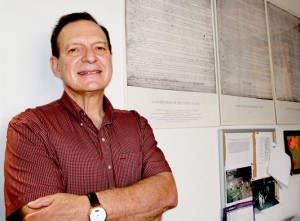Dr. Clifford H. Spiegelman, distinguished professor of statistics at Texas A&M University, and key SWUTC researcher has been recognized as a 2014 Fellow of the American Association for the Advancement of Science (AAAS).
Spiegelman is one of two Texas A&M professors who are among the 401 AAAS members honored by their peers with the prestigious distinction this year for scientifically or socially distinguished efforts to advance science or its applications.
This year’s AAAS Fellows will be formally announced in the “AAAS News & Notes” section of the Nov. 28 edition of the journal Science. In addition, each will be presented with an official certificate and gold and blue (representing science and engineering, respectively) rosette pins in a Saturday, February 14 ceremony at the AAAS Fellows Forum during the 2015 AAAS Annual Meeting in San Jose, Calif.
Spiegelman is an expert in statistical and environmental forensics as well as a founder within statistics of the field of chemometrics, the science of using data to extract information from chemical systems. He also is a senior research scientist with the Texas A&M Transportation Institute, the state’s transportation research agency. He joined the Texas A&M Department of Statistics in 1987 as an associate professor, earning promotion to full professor in 1990 and to distinguished professor in 2009.
Specifically, Spiegelman is cited by AAAS “for leadership in addressing complex, real-world problems, especially in chemometrics, transportation, forensics and social program evaluation through the development, application and communication of innovative statistical methodology.”
“Cliff Spiegelman has been an outstanding statistician at Texas A&M for 27 years, and during that time he has devoted much of his time to real-world problems ranging from transportation to forensics, with many other stops along the way,” said Dr. H. Joseph Newton, Dean of the College of Science. “He is known as one of the founders of chemometrics; the application of statistics to chemistry. We are indeed fortunate to have on our faculty a researcher and teacher like Cliff who has made such a broad impact in several important areas.”
Spiegelman is a fellow of both the American Statistical Association (ASA) and the Institute of Mathematical Statistics (IMS) as well as an elected member of the International Statistical Institute (ISI). He is a two-time recipient of the ASA Statistics in Chemistry Award for best paper and also has received the 2007 Jerome Sacks Award for Outstanding Cross-Disciplinary Research.
Spiegelman was instrumental in the Federal Bureau of Investigation (FBI) decision to stop using compositional bullet lead analysis after he demonstrated it to be flawed. Related research prompted revisiting the possibility of a second shooter in the assassination of President John F. Kennedy. The subsequent article on that topic that appeared in the Annals of Applied Statistics led to his second career ASA Statistics in Chemistry Award. He routinely co-authors forensic columns for the Austin American-Statesman and also testifies in criminal matters on other aspects of statistics, flawed forensic science, probability and the law — often in association with the Innocence Project, the national nonprofit legal clinic dedicated to exonerating wrongfully convicted people through DNA testing and other post-verdict methods.
The tradition of AAAS Fellows began in 1874. Currently, members can be considered for the rank of fellow if nominated by the steering groups of the Association’s 24 sections, or by any three fellows who are current AAAS members — so long as two of the three sponsors are not affiliated with the nominee’s institution — or by the AAAS chief executive officer.
To learn more about the American Association for the Advancement of Science, visit www.aaas.org.
